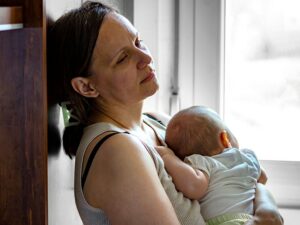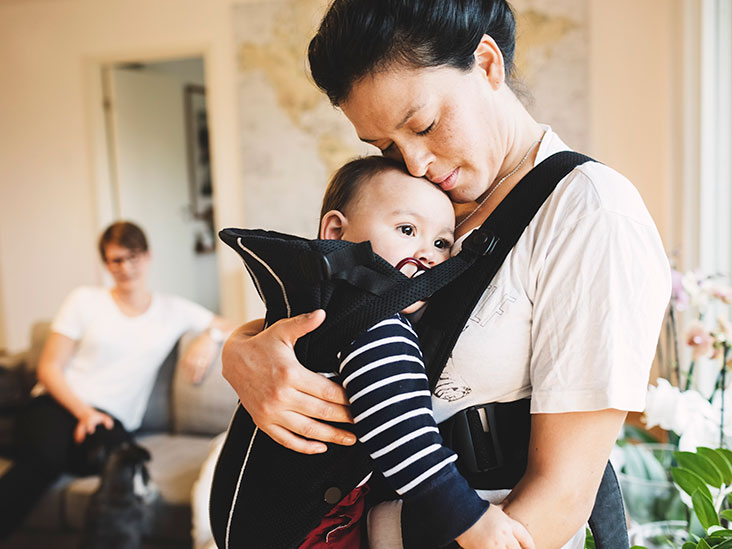If you are a new mom, it is important to be aware of postpartum anxiety. This type of anxiety can occur after giving birth and can affect your ability to take care of your baby. Symptoms of postpartum anxiety include feeling overwhelmed, excessive worry, and having trouble sleeping. It is important to seek help if you are experiencing these symptoms. In this blog post, we will discuss the causes and symptoms of postpartum anxiety, as well as treatment options.
Contents
What Is Postpartum Anxiety?
 Postpartum anxiety is a form of anxiety that can occur after having a baby. It is different from the more common postpartum blues, which usually go away within a few days. This condition can last for weeks or even months. It is a condition described as a feeling of constant worry, nervousness, or fear.
Postpartum anxiety is a form of anxiety that can occur after having a baby. It is different from the more common postpartum blues, which usually go away within a few days. This condition can last for weeks or even months. It is a condition described as a feeling of constant worry, nervousness, or fear.
Many women feel like they are not good enough mothers. And that something bad is going to happen to their baby. According to studies, postpartum anxiety affects up to 20% of new mothers. It is important to seek help if you think you might have postpartum anxiety.
What Are The Signs Of Postpartum Anxiety?
The signs and symptoms of postpartum anxiety can be hard to spot. Many new moms experience some form of “baby blues” after giving birth, which can include mood swings and tearfulness.
Postpartum anxiety is different from baby blues in that it’s more severe and long-lasting. It can interfere with your ability to care for your baby and enjoy this special time. If you have this condition, you may feel:
- Restless or agitated
- Irritable or easily angered
- Fearful or panicky
- Overwhelmed or hopeless
- Trouble sleeping or concentrating
These feelings are intense and can be very frightening. If you have any of these symptoms, it’s important to tell your doctor or midwife. So they can help you get the treatment you need.
Moreover, postpartum anxiety can happen along with postpartum depression. If you have both conditions, it’s called perinatal mood and anxiety disorder (PMAD). It’s important to get help if you think you might have PMAD.
If left untreated, this condition can lead to more difficult problems. These can include substance abuse, relationship difficulties, and even thoughts of harming yourself or your baby.
What Causes Postpartum Anxiety?
 The causes of postpartum anxiety are not fully understood. However, it is thought to be related to the hormonal changes that occur after childbirth. These changes can affect a woman’s mood and energy levels, which can lead to anxiety. Some of the common causes include:
The causes of postpartum anxiety are not fully understood. However, it is thought to be related to the hormonal changes that occur after childbirth. These changes can affect a woman’s mood and energy levels, which can lead to anxiety. Some of the common causes include:
Hormonal Changes
It is the primary cause of postpartum anxiety. After you give birth, your estrogen and progesterone levels drop sharply. This hormonal change can cause mood swings, irritability, and fatigue — all of which can contribute to anxiety. In fact, it is thought that the hormonal changes are responsible for up to 80% of postpartum anxiety cases.
Sleep Deprivation
Having a baby can be exhausting. You may be up all night caring for your newborn, which can leave you feeling tired and overwhelmed. This can lead to anxiety and even depression. For example, one study found that sleep deprivation was a major factor in postpartum anxiety. However, it is important to note that sleep deprivation can also be caused by other factors, such as stress.
Lack of Support
 It is common for new mothers to feel isolated and alone. This can be due to a lack of family or friends nearby, or simply because you are now responsible for a small human being. This isolation can lead to anxiety and even depression. Moreover, lack of support can make it difficult to cope with the stress of motherhood.
It is common for new mothers to feel isolated and alone. This can be due to a lack of family or friends nearby, or simply because you are now responsible for a small human being. This isolation can lead to anxiety and even depression. Moreover, lack of support can make it difficult to cope with the stress of motherhood.
Stressful Life Events
Giving birth is a big life event. Along with the joy of becoming a parent, you may also be dealing with the stress of caring for a new baby. This can trigger anxiety or make it worse if you’re already struggling with anxiety disorders. Life events are always stressful, and some women may be more vulnerable to postpartum anxiety.
Changes in Routine
When you are a new parent, your life changes drastically. You may no longer have time for the things you used to enjoy doing. And your routine is more likely to be disrupted. This can lead to anxiety and even depression. For example, one study found that women who experienced changes in their daily routine were more likely to experience postpartum anxiety.
Anxiety is a normal part of postpartum for many women. It is important to seek help if you are struggling with anxiety or feeling overwhelmed. These causes are just a few of the things that can contribute to this condition. If you are struggling, please reach out to your doctor or mental health professional.
Postpartum Anxiety v/s Postpartum Depression
Postpartum anxiety is usually characterized by overwhelming worry and fear. A woman may feel like she is not able to cope with the demands of motherhood. She may also have irrational thoughts about her baby’s safety.
Postpartum depression, on the other hand, is characterized by feelings of sadness, hopelessness, and worthlessness. A woman may feel like she is not able to bond with her baby or maybe afraid to be alone with her baby.
Both conditions are serious and get confused because they have some similar symptoms. But it is important to understand that they are two different conditions. The major difference between postpartum anxiety and depression is that anxiety is characterized by worry and fear. While depression is characterized by feelings of sadness and hopelessness.
So, the condition is often misdiagnosed as depression when it is actually anxiety or vice versa. If you think you might be suffering from either of these conditions, please reach out to your doctor or a mental health professional for help.
Postpartum Anxiety and depression are treatable. With the right support, women can recover and feel like themselves again.
How To Treat Postpartum Anxiety?
 The treatment for postpartum anxiety may vary from person to person. Some may require medication while others may not. The important thing is to get help from a professional if you think you might have postpartum anxiety. Also, the diagnosis of this condition is important. Because it can help you and your doctor to understand what treatments may work best for you.
The treatment for postpartum anxiety may vary from person to person. Some may require medication while others may not. The important thing is to get help from a professional if you think you might have postpartum anxiety. Also, the diagnosis of this condition is important. Because it can help you and your doctor to understand what treatments may work best for you.
However, here are some ways through which you can get rid of postpartum anxiety:
Talk To Your Doctor
This is the most important thing you can do if you think you have this condition. Your doctor will be able to tell if you have postpartum anxiety and will also be able to prescribe medication if necessary. Because your gynecologist or midwife will be familiar with your medical history. So, they’ll be able to give you the best possible care. However, for further help with postpartum anxiety, you definitely need to see a specialist.
Get Support From Your Partner
As postpartum anxiety is related to hormonal changes. So, it’s important to get support from your partner during this time. Because they can help you through the tough times and can provide a shoulder to cry on. In fact, your partner should also be aware of the signs and symptoms of postpartum anxiety. So, that they can help you if you’re feeling anxious or stressed.
Join A Support Group
 There are many postpartum anxiety support groups available online as well as offline. Joining one of these groups can be extremely helpful. Because support groups are already aware of the problem and can offer you practical as well as emotional support. Also, these groups usually have experienced counselors who can help you deal with your anxiety.
There are many postpartum anxiety support groups available online as well as offline. Joining one of these groups can be extremely helpful. Because support groups are already aware of the problem and can offer you practical as well as emotional support. Also, these groups usually have experienced counselors who can help you deal with your anxiety.
Exercise Regularly
Exercising is one of the best ways to deal with any kind of anxiety. Because it helps to release endorphins, which are natural mood boosters. Even during pregnancy time, exercise is considered to be a great way to deal with anxiety. However, make sure to consult your doctor before starting any kind of exercise regime. But overall, exercise is definitely a great way to deal with postpartum anxiety.
Yoga and Meditation
Yoga and meditation are two of the most effective ways to deal with postpartum anxiety. Because they help you to relax and focus on your breath. Both yoga and meditation have been proven to be effective in reducing stress and anxiety. So, if you’re suffering from postpartum anxiety, then definitely give them a try. Even so, there are numerous techniques for practicing meditation. Some of these include:
- Transcendental Meditation
- Guided Meditation
- Mindfulness Meditation
Take Some Time Off
After delivery, it’s important to take some time off from work. So, that you can focus on your health and on bonding with your baby. Because if you’re not taking care of yourself, then you won’t be able to take care of your baby. Also, it’s important to have some me-time. So, that you can relax and de-stress.
Talk To A Therapist
Therapy is often considered to be a great way to deal with anxiety and stress. Because talking to a therapist can help you understand your thoughts and feelings. Also, they can help you find new ways to cope with your anxiety. So, if you think you need help, then definitely consider talking to a therapist. The best therapy is CBT or cognitive behavioral therapy.
Postpartum anxiety is a very real problem that many women face after giving birth. It’s important to understand that you’re not alone and that there are ways to deal with it. If you think you might have postpartum anxiety, then definitely talk to your doctor. And get help from a professional if necessary.
So, these were some of the ways through which you can get rid of postpartum anxiety. If you’re suffering from this problem, then make sure to consult a professional and get help.
People’s Outlook On Postpartum Anxiety
 There are many things that can contribute to a person’s outlook on postpartum anxiety. People often look towards their friends and family for support, but sometimes that’s not enough. The stigma surrounding mental health can make it difficult for people to talk about their anxiety openly. This is why it’s so important to educate yourself on the topic.
There are many things that can contribute to a person’s outlook on postpartum anxiety. People often look towards their friends and family for support, but sometimes that’s not enough. The stigma surrounding mental health can make it difficult for people to talk about their anxiety openly. This is why it’s so important to educate yourself on the topic.
People often look to those who have “gone through it” for advice on how to cope with this condition. But every person’s experience is different. So while some well-meaning advice might work for one person, it might not work for another.
In fact, some people see this anxiety as a badge of honor. They see it as a sign that they’re doing something right as a parent. After all, if you’re not anxious, you’re not caring enough, right? This kind of thinking is harmful and can make it difficult for people to seek help.
Postpartum anxiety is nothing to be ashamed of. It’s a real condition that deserves to be treated like any other mental illness. If you’re struggling, reach out to a professional for help.
Conclusion
To conclude, postpartum anxiety is a real and serious problem that many mothers face. It is important to seek help if you think you may be suffering from it. There are many resources available to help you, so please do not hesitate to reach out for help. In fact, this condition is one of the most treatable forms of anxiety, so there is no need to suffer in silence.
Moreover, people close to you can also look out for the signs and help you get the support that you need. Postpartum anxiety does not have to control your life. But with proper treatment, it can be managed effectively. Hence, if you think you have postpartum anxiety, please do not hesitate to seek help from a professional.
For more information, please contact MantraCare. Anxiety is a common mental health condition characterized by persistent feelings of worry, fear, and apprehension. If you have any queries regarding Online Anxiety Counseling experienced therapists at MantraCare can help: Book a trial Anxiety therapy session


